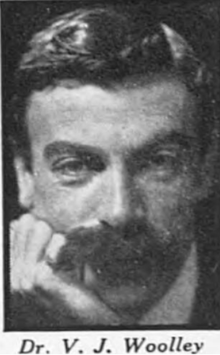V. J. Woolley
Victor James Woolley (1878-1966) was a British physiologist and parapsychologist.[1]
Victor James Woolley | |
|---|---|
 | |
| Born | 1878 |
| Died | 1966 |
| Occupation | Physiologist, parapsychologist |
Career
Woolley was born in East Bergholt, Suffolk. His father was Joseph Woolley, the Archdeacon of Suffolk.[2] He studied anatomy and physiology at King's College, Cambridge. He obtained his M.D. from Cambridge University in 1912. In 1902 he was elected a member of The Physiological Society and he published papers in the Journal of Physiology (1907-1915). He worked as a lecturer at St Thomas's Hospital.[2]
Woolley was a council member and the Honorary Research Officer of the Society for Psychical Research (SPR).[3][4] He resigned from the SPR in 1932.[5]
In February 1927, with the co-operation of the British Broadcasting Corporation (BBC), Woolley who was at the time the Research Officer for the SPR, arranged a telepathy experiment in which radio listeners were asked to take part. The experiment involved 'agents' thinking about five selected objects in an office at Tavistock Square, whilst listeners on the radio were asked to identify the objects from the BBC studio at Savoy Hill. 24, 659 answers were received. The results revealed no evidence for telepathy.[3][6][7]
Woolley was a friend of English novelist E. M. Forster and went on holiday with him to Italy in the 1900s.[8][9][10]
Selected publications
- — . (1907). On an apparent muscular inhibition produced by excitation of the ninth spinal nerve of the frog, with a note on the Wedensky inhibition. The Journal of Physiology 36: 177-184.
- — . (1908). The temperature coefficient of the rate of conduction and of the latent period in muscle. The Journal of Physiology 37: 122-129.
- — ; Mellanby, J. (1912). The ferments of the pancreas: Part I. The generation of trypsin from trypsinogen by enterokinase. The Journal of Physiology 45: 370-388.
- — ; Mellanby, J. (1913). The ferments of the pancreas: Part II. The action of calcium salts in the generation of trypsin from trypsinogen. The Journal of Physiology 46: 159-172.
- — . (1926). An Account of a Series of Sittings with Mr. George Valiantine. Proceedings of the Society for Psychical Research 36: 52-77.
- — . (1928). The Broadcasting Experiment in Mass Telepathy. Proceedings of the Society for Psychical Research 38: 1–9.
- — . (1930). The Margery Mediumship, and the London Sittings of December 1929. Proceedings of the Society for Psychical Research 39: 358-368.
References
- Forster, Edward Morgan; Lago, Mary; Furbank, Philip Nicholas. (1983). Selected Letters of E.M. Forster: 1879-1920. The Belknap Press of Harvard University Press. p. 86
- O'Connor, W. J. (1991). British Physiologists 1885-1914: A Biographical Dictionary. Manchester University Press. pp. 252-253
- Mauskopf, Seymour H; McVaugh, Michael Rogers. (1980). The Elusive Science: Origins of Experimental Psychical Research. Johns Hopkins University Press. pp. 36-38. ISBN 978-0801823312
- Johnson, George M. (2006). Dynamic Psychology in Modernist British Fiction. Palgrave Macmillan. Palgrave Macmillan. p. 89. ISBN 978-1-349-52116-6
- Price, Harry. (1939). Fifty Years of Psychical Research. Longmans, Green & Co. "V. J. Woolley, who resigned from the S.P.R. in 1932 on account of friction with certain of the officers."
- Edmunds, Simeon. (1965). Miracles of the Mind: An Introduction to Parapsychology. C. C. Thomas. pp. 26-28
- Harry Price (2012-06-01). Fifty Years of Psychical Research. David & Charles. pp. 274–5. ISBN 978-1-4463-5772-9.
- Sunil Kumar Sarker (1 January 2007). A Companion to E.M. Forster. Atlantic Publishers & Dist. p. 36. ISBN 978-81-269-0748-9.
- John Gross (2008). The New Oxford Book of Literary Anecdotes. Oxford University Press. p. 234. ISBN 978-0-19-954341-0.
- Lello, John Lello ; illustrated by Sanda (2001). The Bloomsbury Group in Venice. London: Cecil Woolf. p. 18. ISBN 9781897967973.